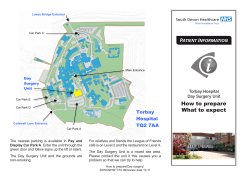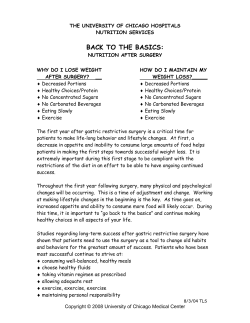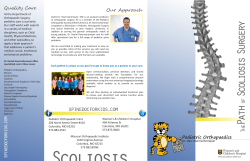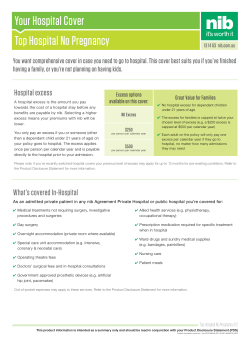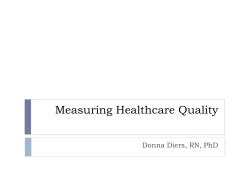
Neoadjuvant therapy for esophageal cancer
World J Gastrointest Oncol 2014 October 15; 6(10): 403-406 ISSN 1948-5204 (online) Submit a Manuscript: http://www.wjgnet.com/esps/ Help Desk: http://www.wjgnet.com/esps/helpdesk.aspx DOI: 10.4251/wjgo.v6.i10.403 © 2014 Baishideng Publishing Group Inc. All rights reserved. MINIREVIEWS Neoadjuvant therapy for esophageal cancer Rachit D Shah, Anthony D Cassano, James P Neifeld Response rates, survival, complete response and outcomes have been thoroughly reviewed. Rachit D Shah, Anthony D Cassano, James P Neifeld, Department of Surgery, Virginia Commonwealth University School of Medicine, Richmond, VA 23298-0068, United States Author contributions: All the authors contributed to this paper. Correspondence to: Rachit D Shah, MD, Assistant Professor of Surgery, Virginia Commonwealth University School of Medicine, PO Box 980068, Richmond, VA 23298-0068, United States. rshah@mcvh-vcu.edu Telephone: +1-804-8284641 Fax: +1-804-6280537 Received: May 19, 2014 Revised: July 2, 2014 Accepted: September 6, 2014 Published online: October 15, 2014 Shah RD, Cassano AD, Neifeld JP. Neoadjuvant therapy for esophageal cancer. World J Gastrointest Oncol 2014; 6(10): 403-406 Available from: URL: http://www.wjgnet.com/1948-5204/full/v6/ i10/403.htm DOI: http://dx.doi.org/10.4251/wjgo.v6.i10.403 INTRODUCTION Nearly 500000 patients are diagnosed with esophageal cancer worldwide yearly, and its incidence has nearly doubled in North America over the last 2 decades[1]. Adenocarcinoma is now the most common cell type in the western hemisphere followed by squamous cell cancer[2]. For locoregional disease, surgery has been the mainstay of therapy with 5-year survival rates ranging from 10%-40% and distant metastasis being the most common mode of treatment failure[3]. Radiation therapy alone has been evaluated for local control and, in one large series 3-year survival was only 6%[4]. Chemotherapy for locally advanced esophageal cancer has a response rate of 45% to 75% in numerous studies but relapse rates are high and long-term survival rates are very low. Use of chemotherapy with or without radiation therapy before surgery has several theoretical benefits. It may improve baseline dysphagia, the most common symptom on presentation. It can help downstage the tumor, which may increase resection rates, and can treat micro-metastatic disease that is not detected on imaging studies. It has the potential to indicate the biologic behavior of the tumor by its response to treatment that may help guide further therapy. The role of multi-modality treatment as a way to achieve higher long-term survival rates has been debated for many years. The roles of chemotherapy and radiation therapy to improve surgical results remain controversial; randomized trials have shown mixed results. This review will examine the data and survival rates for using pre- Abstract Esophageal cancer is increasing in incidence more than any other visceral malignancy in North America. Adenocarcinoma has become the most common cell type. Surgery remains the primary treatment modality for locoregional disease. Overall survival with surgery alone has been dismal, with metastatic disease the primary mode of treatment failure after an R0 surgical resection. Cure rates with chemotherapy or radiation therapy alone have been disappointing as well. For these reasons, over the last decade multi-modality treatment has gained increasing acceptance as the standard of care. This review examines the present data and role of neoadjuvant treatment using chemotherapy and radiation therapy followed by surgery for the treatment of esophageal cancer. © 2014 Baishideng Publishing Group Inc. All rights reserved. Key words: Neoadjuvant therapy; Esophageal cancer; Esophagectomy; Chemotherapy Core tip: This review evaluates the current literature on the use of neoadjuvant chemotherapy with or without radiation therapy for the treatment of locally advanced esophageal cancer. Major randomized controlled trials and co-operative group studies have been evaluated. WJGO|www.wjgnet.com 403 October 15, 2014|Volume 6|Issue 10| Shah RD et al . Neoadjuvant therapy for esophageal cancer operative chemotherapy and radiation therapy, alone or in combination, in the management of localized esophageal cancer. NEOADJUVANT RADIATION THERAPY In a trial of 96 patients by Kelsen et al[10], patients were assigned to preoperative radiotherapy or chemotherapy. The morbidity and mortality of surgery following preoperative treatment was no different compared to historical controls of surgery alone but there was no survival benefit of preoperative treatment. Another randomized trial of 176 patients comparing preoperative radiation (20 Gy in 10 treatments) followed by surgery vs surgery alone[11] showed no benefit of radiotherapy with overall 5-year survival of 13%. In a Scandinavian trial of 186 patients, Nygaard et al[12] showed an improved 3-year survival in patients receiving preoperative radiotherapy compared to patients undergoing surgery alone or chemotherapy and surgery. A meta-analysis has not shown a statistically significant survival benefit for preoperative radiation[13]. At a median follow-up of 9 years, the survival benefit at 2 and 5 years was 3% and 4% respectively (P = 0.062). Thus neoadjuvant radiation therapy alone cannot be advocated for the management of esophageal cancer. NEOADJUVANT CHEMOTHERAPY In a study by Boonstra et al[5], 169 patients with squamous cell cancer were randomized to 2-4 cycles of cisplatin and etoposide followed by surgery or surgery alone. Median overall survival in the two groups was 16 and 12 mo respectively. The 5-year survival in the chemotherapy group was 26% vs 17% in the surgery alone group (P = 0.03, hazard ratio 0.71; 95%CI: 0.51-0.98). Contrary to this study result, a large North American Intergroup 113 trial failed to show a survival benefit for three cycles of preoperative cisplatin/5-FU followed by surgery and two additional cycles of cisplatin/5-FU compared to surgery alone[3]. Both squamous and adenocarcinoma patients were included. With a study size of 440 patients, overall survival in each group was 20% and there was no benefit of chemotherapy seen in resection rates, local failure, or distant metastasis. In a much larger study by the Medical Research Council Oesophageal Cancer Working group[6], 802 patients were randomized to two cycles of cisplatin/5-FU followed by surgery vs surgery alone. Median and 2-year survivals were improved in the chemotherapy group (16.8 mo vs 13.3 mo-difference 107 d; 95%CI: 30-196, and 43% vs 34%-difference 9%; 95%CI: 3-14, respectively). The curative resection rate was improved marginally from 55% to 60%. The MAGIC trial, performed in the United Kingdom[7], further reinforced the findings seen in the Medical Research Council study. A total of 503 patients with distal esophageal, GE junction and gastric adenocarcinoma were randomized to three cycles of pre and postoperative cisplatin/5-FU/epirubicin or surgery alone. Overall survival in the chemotherapy group was significantly better (36% vs 23%, P = 0.009), but fewer than one third of the patients in this study had distal esophageal adenocarcinoma. In a French study[8] of 224 patients randomized to 2-3 cycles of preoperative cisplatin/5-FU followed by surgery vs surgery alone, there was a significantly improved R0 resection rate (84% vs 73%, P = 0.04), 5-year disease free survival (34% vs 21%, P = 0.003), and 5-year overall survival (38% vs 24%, P = 0.02) following chemotherapy. The data published in these studies are quite heterogeneous. Some studies have both squamous and adenocarcinoma patients while some have only adenocarcinoma patients. The chemotherapy drugs and regimens vary between studies as well. In a meta-analysis of 12 randomized trials in which pre-operative chemotherapy was used, the 5-year overall survival benefit was only 4%[9]. The benefit was somewhat smaller for squamous cell cancer compared to adenocarcinoma (4% vs 7%). Thus, the available data do not suggest that the use of neoadjuvant chemotherapy significantly improves survival. WJGO|www.wjgnet.com NEOADJUVANT CHEMORADIOTHERAPY (COMBINED THERAPY, TRIMODALITY THERAPY) Neither preoperative radiation therapy nor chemotherapy alone in the neoadjuvant setting have been proven beneficial based on the trials[5,7-9] performed. This may be related to the low complete pathologic response rates, mostly between 2.5%-4%. The improvement in R0 resection and overall survival has been limited as well. Most patients who undergo surgical resection die from distant metastatic disease in spite of an R0 resection. Considering these results and for the reasons listed earlier in this review for using neoadjuvant therapy, combination therapy with all three modalities has been utilized to try to improve overall outcomes. We will first review the studies looking at trimodality therapy vs surgery alone. Trimodality therapy vs surgery alone Bosset et al[14] randomized 282 patients to preoperative cisplatin and concurrent radiation or surgery alone. Although the curative resection rate was higher with combined therapy (81% vs 69%), disease-free survival was improved (HR 0.6, 95%CI: -0.4-0.9, P = 0.003), and risk of local recurrence decreased (HR 0.6, 95%CI: -0.4-0.9, P = 0.01), there was no difference in overall survival. This may at least in part be due to higher than expected treatment related mortality in the chemo-radiation arm (12% vs 4%). This study only included patients with squamous cell cancers, and radiation was given using a split-dose technique. Burmeister et al[15] in an Australian study randomized 256 patients to one cycle of cisplatin/5-FU and radiation 404 October 15, 2014|Volume 6|Issue 10| Shah RD et al . Neoadjuvant therapy for esophageal cancer followed by surgery or to surgery alone. R0 resection was achieved in 80% of the patients in the combined therapy group vs 59% in the surgery alone arm. However, the overall survival was no different between the two groups. Patients with adenocarcinoma had a decreased rate of complete pathologic response and were more likely to have disease progression during the follow-up period. In a study from the University of Michigan[16], 100 patients were randomized to preoperative cisplatin/5FU/vinblastine plus radiation or to surgery alone. There was a significant decrease in the rate of local recurrence with combined therapy (19% vs 42%, P = 0.03) and a trend towards improved survival at 3 years (30% vs 16%, P = 0.15). In an Irish study of 113 patients, Walsh et al[17] showed a significant improvement in overall survival at 3 years (32% vs 6%) with preoperative cisplatin/5-FU/radiation followed by surgery vs surgery alone. All patients in this study had adenocarcinoma but the extremely poor 3-year survival in the surgery alone arm (6%) could not be explained. In 2012, a multi-institutional phase Ⅲ study (CROSS trial)[18] evaluated the benefit of induction therapy using carboplatin/taxol/41Gy radiation vs surgery alone. Only a quarter of the patients had squamous histology. There was an anastomotic leak rate of 22%-30% in each arm. Median survival was 49 mo in the combined therapy arm compared to 24 mo in the surgery arm (P = 0.003). The overall 5-year survival was much improved in the combined therapy arm (47% vs 34%, P = 0.03). Patients with squamous histology derived a larger benefit. An updated analysis[19] of this group of patients showed a lower local recurrence rate (34% vs 14%, P < 0.001) and lower risk of peritoneal carcinomatosis (14% vs 4%, P < 0.001) following neoadjuvant chemoradiation and that squamous cell carcinoma was an independent prognostic variable in the surgery alone group. management of esophageal cancer. CONCLUSION The three mainstays of treatment for esophageal cancersurgery, chemotherapy, and radiation therapy result in poor overall survival and high relapse rates when used alone. Preoperative combination therapy offers several theoretical advantages but for stage 1 and 2 esophageal cancers, there is, as of now, no convincing evidence that neoadjuvant chemoradiation is of any benefit. Neoadjuvant chemoradiotherapy achieves the highest complete pathologic response rates, R0 resection rates, and improves 3-5 years survival rates in patients with locally advanced esophageal cancer. The addition of neoadjuvant radiotherapy to preoperative chemotherapy may facilitate a better complete surgical resection via its effect on the periphery of the tumor. Squamous cell cancer and adenocarcinoma appear to have similar disease-free and overall survival rates following neoadjuvant chemoradiotherapy. Further randomized, prospective trials will be required to build on these early studies to try to improve the prognosis of patients with this terrible disease. REFERENCES 1 2 3 Neoadjuvant chemoradiation vs neoadjuvant chemotherapy alone Stahl et al[20] reported their data of 120 patients with T3 or higher and/or node positive patients who were randomized to preoperative cisplatin/5-FU/leucovorin followed by surgery vs cisplatin/5-FU/leucovorin followed by chemoradiotherapy with cisplatin/etoposide and then surgery. Trimodality patients had a higher rate of pathologic complete response (16% vs 2%, P = 0.03) and nodenegative status (64% vs 37%, P = 0.01). The overall 3-year survival was not statistically significantly different in the two groups with a median overall survival of 32.8 vs 21.1 mo (P = 0.14). In a recent meta-analysis[9] of 10 randomized trials of trimodality therapy vs surgery alone and 8 trials of preoperative chemotherapy vs surgery alone, trimodality therapy was associated with a 13% benefit in survival at 2 years, both in squamous and adenocarcinoma. Preoperative chemotherapy alone translated to a 7% benefit in survival at 3 years, more in adenocarcinoma than in squamous cell cancer. Thus, these data suggest a synergistic benefit using neoadjuvant chemotherapy plus radiotherapy in the WJGO|www.wjgnet.com 4 5 6 7 8 405 Ferlay J, Shin HR, Bray F, Forman D, Mathers C, Parkin DM. Estimates of worldwide burden of cancer in 2008: GLOBOCAN 2008. Int J Cancer 2010; 127: 2893-2917 [PMID: 21351269 DOI: 10.1002/ijc.25516] Devesa SS, Blot WJ, Fraumeni JF. Changing patterns in the incidence of esophageal and gastric carcinoma in the United States. Cancer 1998; 83: 2049-2053 [PMID: 9827707] Kelsen DP, Ginsberg R, Pajak TF, Sheahan DG, Gunderson L, Mortimer J, Estes N, Haller DG, Ajani J, Kocha W, Minsky BD, Roth JA. Chemotherapy followed by surgery compared with surgery alone for localized esophageal cancer. N Engl J Med 1998; 339: 1979-1984 [PMID: 9869669 DOI: 10.1056/ NEJM199812313392704] Earlam R, Cunha-Melo JR. Oesophageal squamous cell carcinoma: I. A critical review of surgery. Br J Surg 1980; 67: 381-390 [PMID: 6155968 DOI: 10.1002/bjs.1800670602] Boonstra JJ, Kok TC, Wijnhoven BP, van Heijl M, van Berge Henegouwen MI, Ten Kate FJ, Siersema PD, Dinjens WN, van Lanschot JJ, Tilanus HW, van der Gaast A. Chemotherapy followed by surgery versus surgery alone in patients with resectable oesophageal squamous cell carcinoma: long-term results of a randomized controlled trial. BMC Cancer 2011; 11: 181 [PMID: 21595951 DOI: 10.1186/1471-2407-11-181] Medical Research Council Oesophageal Cancer Working Group. Surgical resection with or without preoperative chemotherapy in oesophageal cancer: a randomised controlled trial. Lancet 2002; 359: 1727-1733 [PMID: 12049861 DOI: 10.1016/S0140-6736(02)08651-8] Cunningham D, Allum WH, Stenning SP, Thompson JN, Van de Velde CJ, Nicolson M, Scarffe JH, Lofts FJ, Falk SJ, Iveson TJ, Smith DB, Langley RE, Verma M, Weeden S, Chua YJ. Perioperative chemotherapy versus surgery alone for resectable gastroesophageal cancer. N Engl J Med 2006; 355: 11-20 [PMID: 16822992 DOI: 10.1056/NEJMoa055531] Ychou M, Boige V, Pignon JP, Conroy T, Bouché O, Lebreton G, Ducourtieux M, Bedenne L, Fabre JM, Saint-Aubert B, Genève J, Lasser P, Rougier P. Perioperative chemotherapy compared with surgery alone for resectable gastroesophageal adenocarcinoma: an FNCLCC and FFCD multicenter October 15, 2014|Volume 6|Issue 10| Shah RD et al . Neoadjuvant therapy for esophageal cancer 9 10 11 12 13 14 15 phase III trial. J Clin Oncol 2011; 29: 1715-1721 [PMID: 21444866 DOI: 10.1200/JCO.2010.33.0597] Gebski V, Burmeister B, Smithers BM, Foo K, Zalcberg J, Simes J. Survival benefits from neoadjuvant chemoradiotherapy or chemotherapy in oesophageal carcinoma: a metaanalysis. Lancet Oncol 2007; 8: 226-234 [PMID: 17329193 DOI: 10.1016/S1470-2045(07)70039-6] Kelsen DP, Minsky B, Smith M, Beitler J, Niedzwiecki D, Chapman D, Bains M, Burt M, Heelan R, Hilaris B. Preoperative therapy for esophageal cancer: a randomized comparison of chemotherapy versus radiation therapy. J Clin Oncol 1990; 8: 1352-1361 [PMID: 1696309] Arnott SJ, Duncan W, Kerr GR, Walbaum PR, Cameron E, Jack WJ, Mackillop WJ. Low dose preoperative radiotherapy for carcinoma of the oesophagus: results of a randomized clinical trial. Radiother Oncol 1992; 24: 108-113 [PMID: 1496141 DOI: 10.1016/0167-8140(92)90287-5] Nygaard K, Hagen S, Hansen HS, Hatlevoll R, Hultborn R, Jakobsen A, Mäntyla M, Modig H, Munck-Wikland E, Rosengren B. Pre-operative radiotherapy prolongs survival in operable esophageal carcinoma: a randomized, multicenter study of pre-operative radiotherapy and chemotherapy. The second Scandinavian trial in esophageal cancer. World J Surg 1992; 16: 1104-1109; discussion 1110 [PMID: 1455880 DOI: 10.1007/ BF02067069] Arnott SJ, Duncan W, Gignoux M, Hansen HS, Launois B, Nygaard K, Parmar MK, Rousell A, Spilopoulos G, Stewart G, Tierney JF, Wang M, Rhugang Z. Preoperative radiotherapy for esophageal carcinoma. Cochrane Database Syst Rev 2005; (4): CD001799 [PMID: 16235286 DOI: 10.1002/14651858.CD001799.pub2] Bosset JF, Gignoux M, Triboulet JP, Tiret E, Mantion G, Elias D, Lozach P, Ollier JC, Pavy JJ, Mercier M, Sahmoud T. Chemoradiotherapy followed by surgery compared with surgery alone in squamous-cell cancer of the esophagus. N Engl J Med 1997; 337: 161-167 [PMID: 9219702 DOI: 10.1056/ NEJM199707173370304] Burmeister BH, Smithers BM, Gebski V, Fitzgerald L, Simes RJ, Devitt P, Ackland S, Gotley DC, Joseph D, Millar 16 17 18 19 20 J, North J, Walpole ET, Denham JW. Surgery alone versus chemoradiotherapy followed by surgery for resectable cancer of the oesophagus: a randomised controlled phase III trial. Lancet Oncol 2005; 6: 659-668 [PMID: 16129366 DOI: 10.1016/S1470-2045(05)70288-6] Urba SG, Orringer MB, Turrisi A, Iannettoni M, Forastiere A, Strawderman M. Randomized trial of preoperative chemoradiation versus surgery alone in patients with locoregional esophageal carcinoma. J Clin Oncol 2001; 19: 305-313 [PMID: 11208820] Walsh TN, Noonan N, Hollywood D, Kelly A, Keeling N, Hennessy TP. A comparison of multimodal therapy and surgery for esophageal adenocarcinoma. N Engl J Med 1996; 335: 462-467 [PMID: 8672151 DOI: 10.1056/NEJM199608153350702] van Hagen P, Hulshof MC, van Lanschot JJ, Steyerberg EW, van Berge Henegouwen MI, Wijnhoven BP, Richel DJ, Nieuwenhuijzen GA, Hospers GA, Bonenkamp JJ, Cuesta MA, Blaisse RJ, Busch OR, ten Kate FJ, Creemers GJ, Punt CJ, Plukker JT, Verheul HM, Spillenaar Bilgen EJ, van Dekken H, van der Sangen MJ, Rozema T, Biermann K, Beukema JC, Piet AH, van Rij CM, Reinders JG, Tilanus HW, van der Gaast A. Preoperative chemoradiotherapy for esophageal or junctional cancer. N Engl J Med 2012; 366: 2074-2084 [PMID: 22646630 DOI: 10.1056/NEJMoa1112088] Oppedijk V, van der Gaast A, van Lanschot JJ, van Hagen P, van Os R, van Rij CM, van der Sangen MJ, Beukema JC, Rütten H, Spruit PH, Reinders JG, Richel DJ, van Berge Henegouwen MI, Hulshof MC. Patterns of recurrence after surgery alone versus preoperative chemoradiotherapy and surgery in the CROSS trials. J Clin Oncol 2014; 32: 385-391 [PMID: 24419108 DOI: 10.1200/JCO.2013.51.2186] Stahl M, Walz MK, Stuschke M, Lehmann N, Meyer HJ, Riera-Knorrenschild J, Langer P, Engenhart-Cabillic R, Bitzer M, Königsrainer A, Budach W, Wilke H. Phase III comparison of preoperative chemotherapy compared with chemoradiotherapy in patients with locally advanced adenocarcinoma of the esophagogastric junction. J Clin Oncol 2009; 27: 851-856 [PMID: 19139439 DOI: 10.1200/ JCO.2008.17.0506] P- Reviewer: Chai J, Iizuka T S- Editor: Song XX L- Editor: A E- Editor: Lu YJ WJGO|www.wjgnet.com 06 October 15, 2014|Volume 6|Issue 10| Published by Baishideng Publishing Group Inc 8226 Regency Drive, Pleasanton, CA 94588, USA Telephone: +1-925-223-8242 Fax: +1-925-223-8243 E-mail: bpgoffice@wjgnet.com Help Desk: http://www.wjgnet.com/esps/helpdesk.aspx http://www.wjgnet.com © 2014 Baishideng Publishing Group Inc. All rights reserved.
© Copyright 2025
